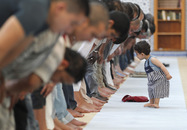
I was at Sultan Mosque tonight and while enjoying the windy breeze awaiting the azan for Isya', overheard small cries of infants/toddlers from the women's section on the second floor. A friend whom I was with, narrated how his sister was chastised just the other day by fellow Muslimahs at Mydin Mosque for the same thing. They chided her for being "rude", "inconsiderate" and that "they should have just stayed at home." In effect, these Muslimahs practically chased her and her child away from the mosque. It reminded me when I was an Imam previously, on many occassions my congregation was more perturbed about having children in the congregation than me as the Imam myself!
Firstly, it is perplexing that she was castigated and chided by mothers, who themselves perhaps not too long ago, had to care for their own young children. Secondly, a mosque is NOT the property or rights of any individuals (mosque management committee members included) but it is the House of Allah - a sacred entity belonging to everyone equally. Thirdly, it is disconcerting that we go to the mosques to offer our service to our Lord but acts and treats His creations with absolute disdain, lacking in respect, compassion and empathy.
Mothers who bring their children to the mosques should be appreciated, respected, welcomed and celebrated. They help to instill in their children, love for the Houses of Allah [s.w.t.]. At a time when all parents worry about how their children will turn out when they grow older, this small seeds of faith planted in their children at such a young and tender age, will assist them, should they go wayward in their adult life later, to return back to the mosques which they are familiar when they were younger.
What would the Prophet [s.a.w.] have done if faced by this situation? In order to elucidate this, let us turn back the clock to about 1,400 years ago. A bedouin urinated in the mosque and the people rushed to beat him. Instead, the Beloved [s.a.w.] ordered them to leave him alone and pour a bucket of water over the place where he urinated. He [s.a.w.] then said, “You have been sent to make things easy (for the people) and you have not been sent to make things difficult for them.” [Bukhari]
This illustrates for us the perfect example of how our behavior should have been. It demonstrates that when any unwanted incident takes place, we should keep our cool and show tolerance and patience. We should find means that would alleviate rather than aggravate the problem. Imagine how nervous the mother and child will be when the congregation stares at them for the noises that the child made. We can be so unwelcoming and harsh to others, without realizing it!
Where is our sense of tolerance and patience? Where is our feeling of compassion and mercy? When and where will we show it, if not in the mosques, of all places? The Beloved Prophet (s.a.w.) said: “He who does not show mercy to others, will not be shown mercy.” [Bukhari]
And he (s.a.w.) understood the anxiety and agony that a mother goes through at such times. That is why he said: “Initially when I entered the prayer, I intended to prolong it. But then I heard the crying of a child, so I shortened it knowing the difficulty his mother will have with him crying.” [Bukhari]
Let us imagine this: if, as a kid, I was scolded for "playing" in the mosque, do you think I would take kindly to any future suggestions by my parents to go to the mosques? And if many of us experience this enough, then as adults, we should not lament why young Muslims avoid our mosques like a plaque!
But more importantly, if our khusyuk during prayers are disrupted by the mere cries of toddlers or the walking of young kids around us: then, I opine and conclude that the problem is not with them but with our own selves, and all that we lack. Such nasty comments and actions by others are simply a reflection of their own lack of appreciation of their prayers and their own inability to attain khusyuk during prayers - and the most convenient first knee-jerk reaction is to blame others for it.
Therefore, heighten your relationship with your Lord so that your every action is just between you and Him alone. Aim for yourself, that no amount of distractions can rob you from your intimacy with Him [s.w.t.]. Only then, that deed is an intimate conversation between a slave and his/her Lord.
Love,
The Alchemist.
 RSS Feed
RSS Feed
